Original Script
[standard characters]
【正體字】
[standard characters]
【正體字】
- will v. 將Jiāng;會huì;要yào
- Robot n. 機器人Jī qì rén
- everything pron. 每件事物Měi jiàn shì wù
- Paper n. 紙Zhǐ; 紙張zhǐ zhāng
- Use v. 使用Shǐyòng; 利用lìyòng
- adj.(little的比較級bǐjiào jí) 較少jiào shǎo; 較小 jiào xiǎo
- Fewer adj.(few的比較級) 較少的jiào shǎo de; 較少數jiào shǎo shù
- Pollution n. 污染Wū rǎn
- Tree n. 樹Shù; 樹木shù mù
- Building n. 建築物Jiàn zhú wù; 房屋fáng wū
- Rocket n. 火箭Huǒ jiàn
- Space n. 空間Kōng jiān; 太空tài kōng
- Space station 空間站kōng jiān zhàn
- Fly v. 飛行Fēi xíng
- Moon n. 月亮Yuè liàng; 月球yuè qiú
- Fall v. 落下Luò xià; 跌落dié luò; 變為biàn wèi
- Fall in love with 愛上ài shàng
- Parrot n. 鸚鵡Yīng wǔ
- Alone adv. 單獨地Dān dú de; 孤獨地gū dú de
- Pet n. 寵物Chǒng wù
- Probably adv. 大概Dà gài; 或許huò xǔ
- Suit n. 一套衣服Yí tào yī fu
- 能夠Néng gòu……;得以déyǐ……
- Dress v. 穿衣Chuān yī
- Casually adv. 非正式地Fēi zhèngshì de;隨意地suíyì de
- Which one 哪個Nǎ ge; 哪幾個nǎ jǐ gè
- Even adv. 甚至Shèn zhì
- The World Cup 世界杯shì jiè bēi
- Interview n. 面試Miànshì; 面談miàntán
- Predict v. 預報Yùbào;預言yùyán
- Future n. 將來Jiāng lái; 未來wèi lái
- Prediction n. 預言Yù yán;預測yù cè
- Come true 實現shí xiàn;達到dá dào
- Sound n. 聲音Shēng yīn
- Company n. 公司Gōng sī
- Fiction n. 小說Xiǎo shuō
- Unpleasant adj. 使人不愉快的 Shǐ rén bùyúkuài de
- Scientist n. 科學家Kē xué jiā
- conj. 可是Kěshì;然而rán'ér
- Already adv. 早已Zǎo yǐ; 先前xiān qián
- Factory n. 工廠 Gōng chǎng
- Simple adj. 簡單的Jiǎn dān de;簡易的jiǎn yì de
- Such adj. 這樣的Zhè yàng de;這種zhè zhǒng
- Bored adj. 厭煩的Yàn fán de;厭倦的yàn juàn de
- Everywhere adv.各地 Gè dì; 到處dào chù
- Human n.人Rén ; 人類rén lèi
- Shape n.外形Wài xíng;形狀xíng zhuàng
- Huge n.巨大的Jù dà de;極大的jí dà de
- Earthquake n. 地震 Dì zhèn
- Snake n.蛇 Shé
- Possible adj.可能的 Kě néng de
- Electric adj. 電的 Diàn de; 導電的 dǎo diàn de
- Toothbrush n.牙刷 Yá shuā
- Seem v. 像是Xiàng shì; 似乎sì hū
- Impossible adj. 不可能的 Bù kěnéng de; 不會發生的 bù huì fāshēng de
- Housework n.家務Jiā wù; 家務事 jiā wù shì
- Rating n. 級別 Jí bié;等級 děng jí

Comments
Post a Comment